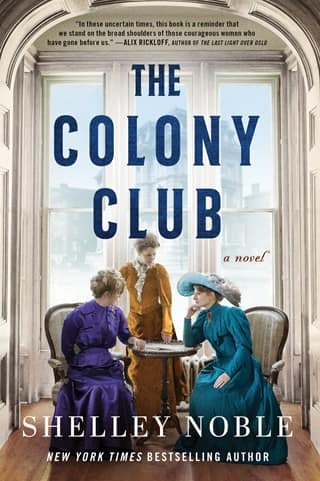Chapter 25
June1906
Newport
Daisy looked up from her book when the parlor door opened.
"Bordie, you're home early. Things too boring for you at the reading room?" Daisy smiled fondly at her husband. She was well
aware that little reading was done at the reading room. Mainly it served the same function for the gentlemen of Newport as
the tearoom did for their wives. If you discounted the cigars, spirits, and racing tips.
"I saw something that was troubling."
"About Stanford? I've decided to steer clear of the news."
Bordie, who had been in the act of unfolding the newspaper he'd been carrying, looked up. "I fully concur... except for
this." He shook the paper and refolded it to a different page.
"Here is today's Journal from the city. I may be mistaken, but isn't this the girl who is working on your club?" He handed her the newspaper and pointed
to a photo. "There."
Daisy sat up and took the proffered paper. Peered at it. A grainy group of men and one small young woman. Daisy held it closer,
gripped the edges.
"What is this?"
Bordie's lips tightened.
"Is it so very bad?" Daisy began to scan the article.
"Someone in the group accused her of being more than the architect's assistant."
"More?" Daisy blinked. "Meaning... Oh, stuff and nonsense. That poor girl works herself to the bone from morning to night. She wouldn't have time for anything else even if she was tempted. Which is also absurd. Though she's a lovely little creature."
"Just like Stanford liked them."
"Please. I'd rather not know." Of course, she already knew. Even women dropped their insular protection at times. They knew
White carried on in improper ways. They didn't delve too deeply. It was not a place one wanted to spend time.
"Well, I won't believe it of her. She's levelheaded. And even if Stanford attempted to seduce her—she may be pretty and young,
but she's tough as nails. No, I won't believe it." She dropped the paper on the side table. "Why on earth are you even reading
that filthy rag?"
"Because it's all the talk down at the reading room. I thought I should come warn you. The men are grumbling about their wives'
names being associated with the man in the papers."
"Well," Daisy said. "They can relax. We are no longer associated with him. He's dead. He was our architect, for heaven's sake."
"Yes, dear, I just thought that forewarned would be forearmed, and I expect you'll be visited by more than one disgruntled
lady on their morning calls tomorrow."
Daisy sighed. "I'll handle them if I must."
"I have no doubt you will, but, Daisy, there may be worse to come."
"What do you mean? You don't think there's any truth in these accusations about Nora, do you?"
Bordie cleared his throat.
"Bordie?"
"Actually, I don't, and hopefully this conjecture will pass into obscurity before anything comes of it. But there are bets
being taken, I'm sorry to say. Not me, I wouldn't trifle with someone's life that way. But you should be prepared."
Daisy's fingers came to her cheek. "And we've left the poor child alone to finish all aspects of the building and furnishings, while dealing with Stanford's... I don't even know what to call them."
"Best not to try," Bordie said, sitting down beside her.
"What were we thinking, leaving town so near the opening? Bessie, Anne, and Elsie in France, me in Newport as if we didn't
have a care in the world. Do you think I should go back?"
"To do what?"
"To make certain Nora's okay and that George Douglas is keeping things moving."
"Doesn't the office have a telephone? Why don't you telephone before you go hieing back to the city? It may blow over fairly
quickly."
"Do you think it will affect the opening of the club?"
"I don't see why. It sounds like George Douglas is on the ball."
"That's not what I meant."
"The scandal, you mean. Well, as for that, we'll just have to wait and see."
By the time Nora got off the trolley at Twenty-third Street, the rain was driving at angles across the street. It didn't matter;
she was already wet; what was a little more? She ducked her head and hurried toward the Parker. Her throat was thick, her
tears mingling with the raindrops until she didn't know which was which. How could Louise be so cruel? Surely she knew Nora
better than that. And Mama just stood there. Why hadn't she stuck up for Nora? Did she think her guilty, too?
Only Rina, in her hotheaded way, took Nora's side. Which Nora loved her for, but worried about what Louise would do to punish
her in the future.
Nora tripped up the steps to the hotel entrance, her stomach sour with hunger and disappointment. Her family had cast her off. She pushed open the door, stood for a minute inside, dripping on the carpet, then headed for the stairs.
"MissBromley?"
Nora looked up to find the desk boy holding out an envelope.
Nora took it. "What is this?"
"It's—it's from the management, I'm afraid."
Nora frowned, not understanding. She tore it open, revealing several coins. She glanced up at him.
The desk clerk chewed on his lip.
There was a folded note, which she pulled out. To MissNora Bromley. You are hereby evicted from this hotel. To begin immediately. The remaining rent for the month is enclosed
within. The hotel staff will see you out by the end of day.
She read it again as the words gradually sank in. Still she didn't believe it. She looked toward the boy.
"They can't do this. I haven't done anything wrong. I'm paid up."
He just stood there looking miserable. "Someone complained."
And she bet she knew who. "Thank you."
She marched to the stairs, climbed the three flights to her room. Her room no more. But when she reached the landing, she
stopped and leaned back against the wall to gather her strength. How could they expect her to leave by tonight? Where would
she go? Her fingers clenched into fists involuntarily. It didn't matter; if they wanted her out, she would leave. And go...
somewhere. Somewhere...
She pushed away from the wall, but her knees gave out and she gripped the stair rail to keep from falling. She took several
long breaths, then crossed to her room. Opened the door.
Lucy and Connie were both there, both with their coats on. She'd obviously caught them before they could escape from having
to admit their perfidy.
"We're sorry," Lucy said, before Nora even spoke. "But we have our own reputations—" Nora struck out her hand to silence her, and Lucy gulped back the next word.
"We packed for you," Connie said. "We're awfully sorry."
They would be, if they had torn, folded, or damaged in any way any of the things she had not yet transferred to the office.
Then she noticed the suitcase on the bed, next to a sack stuffed full and her portfolio bulging at the seams.
And suddenly she was too overwhelmed to even look at what was inside.
She pulled up every vestige of strength, crossed to the bed, and took one brief look around the room, to make sure they hadn't
missed anything. They hadn't. The only thing Nora could do was leave. She hoisted the bag, the suitcase, and the portfolio—everything
she owned in the world—and struggled to the door.
"Good luck," said Connie.
Nora didn't stop, but banged through the door. Lucy ran after her.
"Where will you go?"
"You should have thought of that before you had me thrown out." Nora lifted her head as best she could and half carried, half
dragged her things to the stairs.
When she heard the door close behind her, she heaved a shuddering sigh, then dragged everything down the stairs to the first
floor.
The desk boy saw her coming and ran over to hold the door. As if he couldn't get rid of her fast enough. She stepped out in
the rain. Stopped on the sidewalk.
Where would she go? She probably had enough cash for a room at the YMCA, if they would even take her in the state she was in. It was
close to eleven. She might just make it to the office before the doorman closed for the night. She could sleep in her office
until the next morning and then decide what to do. At least she would be dry and safe.
But she couldn't walk. She hoisted her belongings and trudged to the corner where she got on the first trolley going east. When she at last stood outside the temporary quarters of the Colony Club, the building was dark. Heart racing, she stumbled up the two steps to the shallow alcove and tried the knob; it was locked. She banged on the door, waited, banged again. It went unanswered.
And all the hard work, the scrimping, the saving, the long hours, the abuse she'd taken, all crashed down on her at once.
She'd been a fool to think she would ever be an architect. The world was cruel to those who had nothing. It was even crueler
to those who tried to rise above their place. Slowly she slid down to sit on the steps, her belongings scattered about her,
the hem of her skirt soaking up the rain.
She could just stay where she was. It wasn't so very long until morning, then she could... could... She shivered. How
had she come to this?
Only a few days ago, everything seemed possible. But in an instant, like the prick of a soap bubble, it was gone. Her hopes,
her determination, her future.
She closed her eyes. Just rest for a while. Something sharp was sticking in her thigh. The protractor in her skirt pocket.
She didn't really care, except the pain was keeping her awake. She slid her hand in the pocket, pushed the protractor away,
and touched something else.
Her fingers wrapped around it automatically. It was a key. The key George had given to her. She hadn't had to use it yet.
She would use it now. Get dry, make herself presentable, and leave before anyone arrived in the morning.
Clasping the key in numb fingers, she gathered up her things and hurried up the street to the Colony Club site.
The door opened easily, like it had been waiting for her. She dropped her things, and quickly locked herself in.
It was blessedly dry inside, and now that she was safe, she felt cold, but not frightened. She wouldn't turn on the lights. Someone might notice. She felt her way toward the construction office. There she turned on the desk lamp and shone it into the corner. No one would see it from the outside.
She dragged her things into the cramped space. Pushed the portfolio to one side and opened her suitcase. She knew there was
water laid on in the first-floor lavatories. She groped her way down the hall in the dark, where she quickly washed her face
and hands and changed into dry clothes. The energy it took left her lightheaded and tired beyond belief. Maybe just a little
sleep, an hour or so before dawn. She swayed as she pulled her old winter coat from the bottom of the suitcase and threw it
on the floor for her bed.
But as she started to collapse onto it, her eye caught sight of a little metal frame propped on the communal desk. It was
the sketch she'd made of George for Christmas. He'd kept it out where he could see it. She lifted it from the desk and, clasping
the cheap tin frame, she lay down on the coat, curled into a ball, and fell asleep.
June1906
Versailles, Villa Trianon
It was a delightful morning, Elsie thought, as she watched Anne pour coffee into the Dresden teacups—trimmed with simple scalloped
edges and adorned with a spray of flowers that echoed the garden without competing with it. The set had called to her from
among the garish wares in the flea market just the week before.
Just delightful. Even with Anne there. Elsie was quite getting used to her, and even inured to seeing those beautiful Poiret and Worth gowns that sat so unflatteringly on her large frame. It was unfortunate. No regimen of exercise and dieting would ever show them to good advantage. She'd soon be off to Switzerland to do the "cure" as she did every summer, and nothing would change.
"It's beyond me," Bessie declared as she tossed down the latest edition of the International Herald Tribune and reached for a muffin. "How Stanny, so charming and generous, so distingué, could let himself be the victim of a crime passionelle ."
"I suspect because the perpetrator was that idiot Harry Thaw," cut in Elsie. "Everyone knew he was not fit for society. And
it doesn't speak much for Evey either." Elsie didn't care about Evey. She was angry at Stanny. He'd talked her into leaving
the stage to design and then had the temerity to get himself killed, leaving her mid–new career and on her own.
"How could he do this?"
Anne looked shocked.
Bessie just reached over and took Elsie's hand in hers. "It's a bit of a setback, but you've survived setbacks before. This
one will be no different."
Dear Bessie, she always knew what to say. How to handle every situation. Elsie would overcome this. Just like she overcame
everything that stood in her way. With Bessie's help, of course.
She owed her so much. And if she had to put up with Anne to make things work, it was a price she was willing to pay.
"Do you think the club's reputation will be sullied because of this?" Anne asked, worry creasing the space between her thick
eyebrows.
"Absolutely not," Elsie said. "It's probably best that everyone is out of town. The scandal is bound to pass before it's time
for us to make the final push." Elsie was not called the best-dressed actress on the Rialto for nothing. She knew that dressing
the part was half the battle. And she knew how to make things work. She would make the Colony Club the best-dressed club in
the city. And not have to depend on Stanford White to do it.
 Fullepub
Fullepub 



